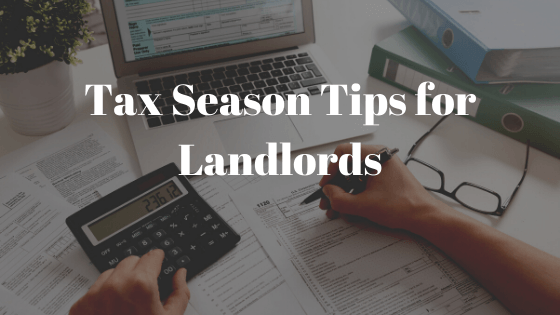Tax Season Tips for Landlords

Landlords have a legal responsibility to pay taxes. Now that the tax season is upon us, it’s crucial to understand all the steps you need to take during this time.
The Internal Revenue Service or IRS states that landlords must report their entire
rental income for tax purposes. The IRS defines rental income as any and all payments received by a landlord from a tenant in exchange to occupy their rental property. This includes rent payments, late rent fees, lease cancellation fees, and tenant-paint expenses.
If you’re a
first-time landlord, this can be challenging. Even seasoned landlords can face obstacles when filing taxes, especially considering the effects of the COVID-19 pandemic. After all, one mistake can cause financial ramifications and affect your ROI!
In this article, we’ll provide you with four tax season tips to help you file your taxes and save money!
1. Maintain Accurate Records
As a landlord, keeping accurate records is key to running a rental property with minimal stress. These records are even more important during tax season! Having these records well-organized will help ease the stress that the tax season brings.
By keeping your documents neatly filed, you’ll find it’s much easier to locate important papers such as receipts for tax-deductible expenses, which you may need as you prepare to file your taxes.

As a landlord, you should keep track of all records. While this might seem excessive, the IRS has a reputation for analyzing every detail when reviewing taxes. So, make sure you have records of both permanent and short-term documents.
You can use the following as a checklist of files to keep on hand:
- Lease agreements
- Costs of advertising your property
- Legal documents, such as inspection reports, fines, court appearances
- Mortgage interest payments
- Property permits
- Professional fees
- Depreciable investments, such as property improvements
- Office expenses
- Insurance policies
- Utilities paid
- Property deed/title
- Travel expenses
- Prior tax filings
- Security deposits received
We recommend keeping your records as both hard and digital copies. While this may seem like a lot of work, it will pay off during the tax season. Not only will you be able to keep your stress levels low, but you’ll also keep your tax filing process streamlined!
2. Take Advantage of Available COVID Resources
Admittedly, the past two years have been difficult for landlords. From wading through moratorium regulations to transitioning to virtual property tours, landlords have had to keep track of a lot. Even as things return to normal, some parts of being a landlord have yet to return to pre-pandemic standards.

At the moment, a majority of small, independent landlords are still grappling with unpredictability in regards to tenant turnover, rent prices, and evictions.
The federal government is no longer providing rental assistance. That said, all hope isn’t lost for landlords. There are still several resources available for landlords during tax season. One such resource is
Benefits.gov which provides landlords with a list of helpful resources, such as forms, editorials and news sources regarding hurdles they faced during the pandemic.
3. Take Advantage of Tax Deductions
Why would you want to pay more taxes than required? As a landlord, the IRS allows you to claim a variety of tax deductions. The common deductions are as follows.
- Mortgage interest payments on loans used to purchase or upgrade your rental property.
- Legal and professional services. You can deduct these as operating expenses as long as the fees are related to your rental activity.
- Insurance premiums. You can deduct the cost of any insurance premiums you pay, such as landlord liability insurance.
- Home offices. As long as you meet the requirements, you may be able to deduct your home office expenses from your taxable income. Please note that this deduction only applies to workspaces you’ve utilized for your business.

- Travel costs. Any travelling you do as a landlord may be tax-deductible. For instance, you can deduct travel expenses if you have to travel to your rental property to respond to a tenant complaint. You have two options to choose from when deducting these expenses: using the standard mileage rate or deducting your actual expenses.
- Personal Property. You may be able to use the de minimis safe harbor deduction to make deductions for any personal property you’ve used as a landlord. This deduction is applicable up to a limit of $2,000. Examples of personal property that qualify include gardening equipment, furniture, and appliances.
- Repairs. Any repair that is ordinary, necessary and reasonable in cost may qualify for a tax deduction. However, these deductions can only be claimed for the year the costs were incurred. Some examples of deductible repairs include fixing gutters, repainting, plastering, and fixing leaks.
- Rental property depreciation. You may be able to recoup some of the costs of buying your rental property through depreciation.
4. File Your Taxes Correctly
How you go about this process depends on how you own the property. If you own the rental property individually, then you’ll need to file your taxes using IRS Schedule E, Supplemental Income and Loss. If you have a partner, both of you must report your individual share of income and expenses using separate Schedule E forms.
For a rental property owned by a business entity, you must use IRS Form 8825. This form is similar to Schedule E.
Bottom Line
Tax season doesn’t always have to be stressful for landlords! To alleviate your concerns, reach out to
Dawson Property Management today!
We provide comprehensive leasing and rental home solutions, including tax services, throughout Charlotte, NC and the surrounding areas.







